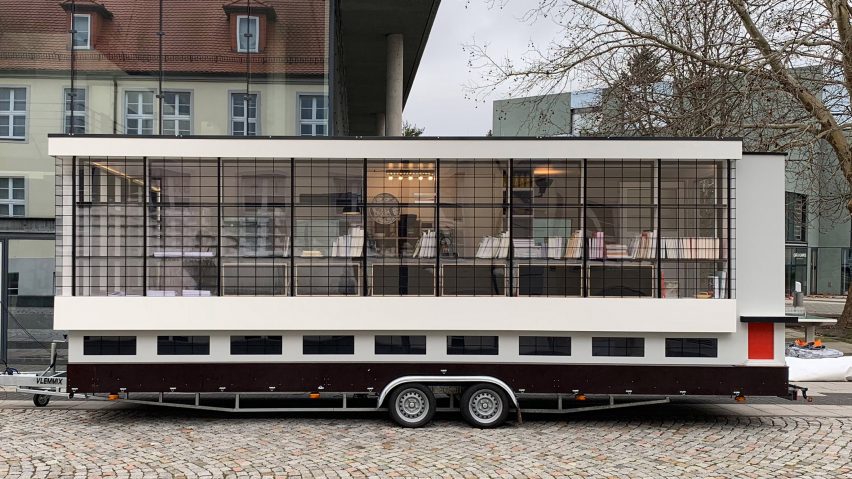A mobile building that looks like the Bauhaus school in Dessau will travel between four global cities, aiming to "unlearn" the influential school's Eurocentric attitudes.
Called Wohnmaschine, which means "living house", the small-scale Bauhaus bus will travel between four cities in 2019, the school's centenary year.
Designed by Berlin-based architect Van Bo Le-Mentzel, the 15-square-metre mobile building is created in the image of the iconic workshop wing of the Bauhaus school building in Dessau – a building conceived by founding director Walter Gropius and built in 1919, to embody the school's core principles and values.
It features the same gridded glass walls that wrap around the building, as well as the famous lettering down one side.
Inside is an apartment-like space, containing an area to host exhibitions and workshops, plus a reading room filled with books charting the Bauhaus' history and legacy.
The project, called Spinning Triangles, begins in Dessau. From there the bus will travel to Berlin, where the Bauhaus-Archiv is located, before travelling overseas to Kinshasa, in the Democratic Republic of the Congo, and Hong Kong.
Over the 10-month tour, design collective Savvy Contemporary will host a series of symposiums and workshops that attempt to challenge and "unlearn" colonial attitudes towards modernity, to develop a more global interpretation of the school's teachings.
"This school will not be developed by the geopolitical west, but through the accelerated movement between deeply interwoven places," said Savvy Contemporary.
"Design has power. It creates our environments, our interactions, our being in the world," added the organisation. "For too long, practices and narratives from the global south have been kept at the periphery of the design discourse, been ignored altogether, or appropriated."
Open to the public, the installation is beginning with four workshops in Dessau between 4 and 22 January, exploring the relationship between colonialism and modernity.
"We will face the relations of coloniality and design as well as its various visibilities and invisibilities," explained Savvy Contemporary.
The Wohnmaschine will travel to Berlin between 24 and 27 January to coincide with the opening festival 100 Years Bauhaus, before making its way to Kinshasa for workshops between 4 and 12 April.
Here, actors from the field of design and from former colonies will play out the roles of various colonies, to discuss how everyday environments can be used to create a "collective future". The intention is to develop an inclusive modernist manifesto, devoid of Eurocentric views.
Five representatives from the workshops in Kinshasa will travel back to Berlin to share their research with 40 students at Savvy Contemporary's headquarters between 22 July and 18 August. The aim is to show that "it may not be the south that needs development but the north".
"Words and actions aim to challenge and transform Bauhaus traditions and narratives of modernity and modernism," said the organisers.
Finally, the school will move to Hong Kong's Para Site art space, where it will discuss its research further.
The project, called Spinning Triangles, is organised by design collective Savvy Contemporary
The Bauhaus school in Dessau was only in operation from 1919 until 1923, when it was forced to close by the rising Nazi Party. It later moved to Berlin under the steer of third and final director Ludwig Mies van der Rohe, where it occupied a converted factory building.
Today the school operates as a centre for design, research and education, and part of it functions as a hotel. A museum is set open on the campus this year, as the building becomes the centre for the 100 Years Bauhaus festival.
The Bauhaus is the most influential art and design school in history. To mark the centenary of the school's founding, we've created a series of articles exploring the school's key figures and projects.
See the full Bauhaus 100 series ›

